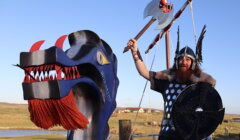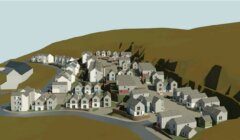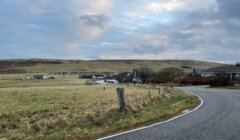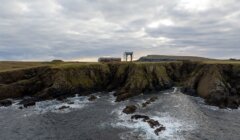Also in the news / Energy consultation, cable fault, facemask guidance and more…
THE COUNCIL is hosting a series of consultation sessions in village halls in addition to an online survey to gauge the views of islanders on rural energy and transport hubs and the ongoing efforts to reduce carbon emissions.
These are proposed facilities powered by renewable energy sources that provide services for the community, such as EV charging, a community car club, e-bike rental, secure cycle storage, EV transition support service, district heating, community waste management facilities and office work space.
Councillor Moraig Lyall who chairs the SIC’s environment and transport committee said this was an opportunity for people to contribute to the work that was ongoing.
“I would encourage Shetland residents to respond to the energy and transport hub survey and attend the public sessions so the council gets a better understanding of what services people would like to see in any future hubs, and how they would like to use them,” she said.
Drop-in public consultation sessions will be held at:
- Brae Hall – Tuesday 23 May, 2pm-7pm
- Scalloway Hall – Wednesday 24 May, 2pm-7pm
- Mid Yell Hall – Thursday 25 May, 2pm-7pm
Anyone interested in attending can sign up at the following links:
The online survey is open to all Shetland residents and can be found here. The deadline for responses is Wednesday 31 May.
TEMPORARY traffic lights have been installed once again along the A971 between Weisdale and Tresta to allow engineers to investigate a blockage that has been detected in one of the fibre ducts of the HVDC cable that will connect Shetland to the national grid.
SSEN Transmission said the work to investigate the fault and address the issue are expected to last up to five weeks
A spokesperson said the initial work would involve “excavation of the carriageway in close proximity to the Scord Viewpoint and pending the findings may lead to a further requirement for excavations along the A971 towards the junction with Cott Road”.
Become a member of Shetland News
PEOPLE working in the health and social care services, and those visiting a hospital or a care home, will no longer be advised to wear facemasks from today (Tuesday).
Scotland’s chief nursing officer Alex McMahon said the government will continue to be vigilant in its response to Covid-19.
“Due to the success of vaccines in protecting people, and the availability of treatments, now is the right time to revise the advice on wearing masks in health and social care settings and return to pre-pandemic guidance,” he said.
“We recognise that some staff may have concerns around the withdrawal of this guidance and would expect organisations to undertake individual occupational health assessments and risk assessments as appropriate.”
A spokesperson for NHS Shetland added: “We would like to remind all visitors not to attend health and social care settings if they are unwell or experiencing any symptoms of infection, such as, flu-like symptoms, cough, or diarrhoea.”
THE SUMBURGH based coastguard helicopter was called out on Sunday afternoon after a sailing vessel raised alarm around 55 nautical miles east of Shetland.
Local vessels in the area were also requested to assist.
The sailing vessel had de-masted, and a nearby vessel was able to assist. The coastguard helicopter was ultimately stood down.
A NEW device for measuring methane emissions from sheep, and thus more accurately pinpointing the impact of livestock on the climate, is being used in the UK for the first time.
The trailer-mounted chambers can predict methane emissions in individual sheep from a variety of systems, including at pasture, as well as in multiple locations.
Scientists can collect air samples and then analyse methane concentration, showing which genetics, feed types and systems generate the highest emission levels.
Dr Nicola Lambe from Scotland’s Rural College (SRUC) said: “There is an urgent need to mitigate greenhouse gas emissions from sheep.
“Recent figures show there are more than 1.2 billion sheep in the world, producing around 7 million tonnes of methane into the atmosphere.
“Despite the fact resource efficiency and greenhouse gas emissions are global priorities, there are few examples around the world of research to implement breeding strategies to directly tackle these issues in sheep.”
Become a member of Shetland News
Shetland News is asking its many readers to consider paying for membership to get additional features and services: -
- Remove non-local ads;
- Bookmark posts to read later;
- Exclusive curated weekly newsletter;
- Hide membership messages;
- Comments open for discussion.
If you appreciate what we do and feel strongly about impartial local journalism, then please become a member of Shetland News by either making a single payment, or setting up a monthly, quarterly or yearly subscription.















































































